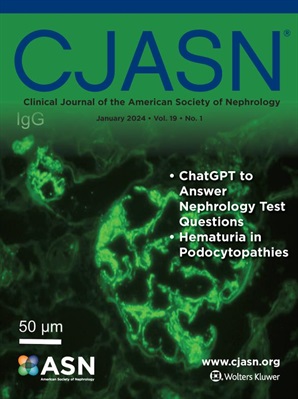在国际肾脏会议上探讨无意识偏见:回顾性分析。
IF 8.5
1区 医学
Q1 UROLOGY & NEPHROLOGY
Clinical Journal of the American Society of Nephrology
Pub Date : 2025-04-15
DOI:10.2215/cjn.0000000696
引用次数: 0
摘要
无意识偏见对学术互动的影响在包括医学领域在内的多个学科中得到了越来越多的关注。我们通过分析美国肾脏病学会(ASN)肾脏周会议主持人对演讲者的介绍,探讨了这些偏差的可能表现。方法:我们分析了2019年、2021年和2023年ASN肾脏周的1534个存档会议。记录了主持人和演讲者的性别、学术级别、会议类型以及介绍中是否有正式的头衔。采用多变量逻辑回归来评估这些特征与主持人使用正式标题频率之间的关系。结果在所有年份中,女性主持人使用正式职称的频率高于男性主持人(估计0.60,标准误差(SE) = 0.18, p <0.05)。与2019年和2023年相比,2021年(虚拟格式)的标题使用率更高(est. 0.76, SE = 0.25, p <0.001)。然而,从2019年到2023年有显著增加(est. 0.74, SE = 0.24, p <0.001)。在职级相互作用方面,正教授介绍副教授(est. 0.82, SE = 0.35, p <0.05)和正教授介绍副教授(est. 0.62, SE = 0.40, p <0.05)使用正式职称的概率都较高。另一方面,助理教授介绍其他助理教授时,使用全名的可能性较低(test . -0.83, SE = 0.35, p <0.05)。基础科学课程在所有年份中表现出最低的比率(p <0.001)。结论本研究提示肾内科学术圈在同行互动中可能存在无意识偏见。为了更清楚地了解这一问题的程度,并制定干预措施,减轻偏见,促进学术环境中的公平,有必要进行进一步的调查,以探索地理和文化特征等其他变量的相互作用。本文章由计算机程序翻译,如有差异,请以英文原文为准。
Exploring Unconscious Bias at International Kidney Conference: A Retrospective Analysis.
BACKGROUND
The impact of unconscious biases on academic interactions has gained increasing attention across several disciplines, including the field of medicine. We explored the possible manifestation of these biases by analyzing presenters' introductions by moderators at the American Society of Nephrology (ASN) Kidney Week Conferences.
METHODS
We analyzed 1534 archived sessions from ASN Kidney Weeks 2019, 2021, and 2023. Moderator and speaker gender, academic rank, session type, and presence of formal titles in introductions were documented. Multivariable logistic regression was conducted to evaluate the relationship between these characteristics and the frequency of formal title usage by moderators.
RESULTS
Female moderators used formal titles more frequently than their male counterparts across all years (estimate 0.60, Standard Error (SE) = 0.18, p <0.05). Title usage was higher in 2021 (virtual format) compared to in 2019 and 2023 (est. 0.76, SE = 0.25, p <0.001). However, there was a significant increase from 2019 to 2023 (est. 0.74, SE = 0.24, p <0.001). With respect to rank interactions, full Professors introducing Associate Professors (est. 0.82, SE = 0.35, p <0.05) and vice versa (est. 0.62, SE = 0.40, p <0.05) both had higher probabilities of formal title usage. On the other hand, Assistant Professors introducing other Assistant Professors showed a lower likelihood of using a full title (est. -0.83, SE = 0.35, p <0.05). Basic science sessions exhibited the lowest rates across all years (p <0.001).
CONCLUSION
Our findings suggest that unconscious bias may exist in peer-to-peer interactions in nephrology academic circles. Further investigation is warranted to explore the interplay of additional variables such as geographic and cultural characteristics to more clearly understand the extent of this issue and develop interventions that mitigate bias and promote equity in academic settings.
求助全文
通过发布文献求助,成功后即可免费获取论文全文。
去求助
来源期刊
CiteScore
12.20
自引率
3.10%
发文量
514
审稿时长
3-6 weeks
期刊介绍:
The Clinical Journal of the American Society of Nephrology strives to establish itself as the foremost authority in communicating and influencing advances in clinical nephrology by (1) swiftly and effectively disseminating pivotal developments in clinical and translational research in nephrology, encompassing innovations in research methods and care delivery; (2) providing context for these advances in relation to future research directions and patient care; and (3) becoming a key voice on issues with potential implications for the clinical practice of nephrology, particularly within the United States. Original manuscript topics cover a range of areas, including Acid/Base and Electrolyte Disorders, Acute Kidney Injury and ICU Nephrology, Chronic Kidney Disease, Clinical Nephrology, Cystic Kidney Disease, Diabetes and the Kidney, Genetics, Geriatric and Palliative Nephrology, Glomerular and Tubulointerstitial Diseases, Hypertension, Maintenance Dialysis, Mineral Metabolism, Nephrolithiasis, and Transplantation.

 求助内容:
求助内容: 应助结果提醒方式:
应助结果提醒方式:


